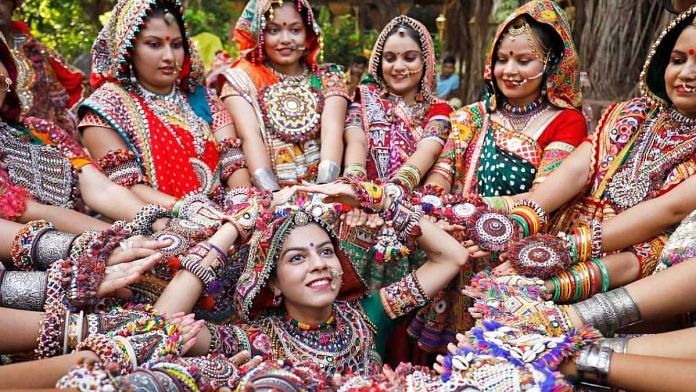It is festive season in India, and the air is thick with spirituality, vibrance and ‘garba’. This lively celebratory dance, infused with kaleidoscopic colours and high-octane music, embodies the joyous spirit of Navratri. And it reminds me of how – from Diwali to Ram Navami – Hindu festivals have always entranced me.
Navratri isn’t just a festival for me; it’s a constant reminder of the precious moments that formed the very foundation of my fondest childhood memories. I can still feel the anticipation that bubbled within me as the festival approached. My loving neighbours would invite my sister and me to their home, tenderly wash our tiny feet, and offer us delectable food. Then, my sister, friends, and I would lose ourselves in the rhythmic beats of garba. Pure bliss.
My Muslim identity was never a problem for the Hindu community around me. Yet, individuals from my own community often advised me against participating in such celebrations. They believed that it would enhance our religious purity. Fortunately, they lacked the authority to impose such views on the broader Indian Muslim population. Although their efforts did pay off sometimes – a segment of Muslims always vehemently refrained from partaking in Hindu festivities. But these people don’t speak for the larger Indian Muslim community, which has retained its diversity and resisted homogeneity.
My Hindu friends would beautifully reciprocate my gestures by involving themselves in Eid celebrations at my home and also joining in the solemn processions of Muharram. This interweaving of traditions, thus, became an integral part of my upbringing.
Upon learning about the Vishwa Hindu Parishad (VHP)’s calls to restrict entry of non-Hindus in Garba pandals, my immediate reaction was one of bewilderment. I was reminded of my encounters with Muslims who advocated against participating in festivals of other faiths. It led me to ponder, “What’s amiss with these individuals? Why are they replicating the very behaviour that I found perplexing and limiting in my own experiences?”
Also read: As a Pasmanda Muslim, I didn’t grow up hearing about Palestine. We had more pressing issues
What drives such ‘bans’?
Two concerns possibly influence such behaviour. The first – overt and widely vocalised – revolves around ‘love jihad’ or harassment from non-Hindu youth. The second centres around the perception that individuals from Abrahamic faiths, particularly Muslims, may not hold a respectful attitude toward other religions. This notion questions why they should actively participate in festivals of other faiths.
The challenge arises when people split into factions instead of addressing concerns. The liberal side resorts to name-calling without delving into on-ground realities, while conservatives often view everything from a black-and-white prism. A parallel scenario unfolds here as well. Instances have arisen where Hindu women have faced harassment from certain Muslim youth driven by a tribalistic and misogynistic mindset that considers women from other communities as ‘fair game’. Acknowledging this reality is crucial. But it’s also imperative to understand that not all Muslims condone such behaviour.
Banning non-Hindus from festivals doesn’t guarantee 100 per cent security. The focus should be on implementing fundamental measures to ensure the safety of women in general. It isn’t right to fuel divide in the name of safety.
Also read: Liberals shy away from advocating for Muslim women. ‘Made in Heaven’ is a good first step
Don’t generalise Muslims
Suggesting that Muslims do not respect other religions and, therefore, should be disallowed creates an overly generalised image of the entire community. While it’s true that there are issues within the Muslim community, making such allegations against every individual is unjust. It’s important to note that Muslims with extreme views, following specific interpretations, may choose not to partake in festive celebrations. However, those individuals who don’t uphold such values are the ones who actively engage in and share the joy of celebrations. By imposing a ban on an entire identity, we risk further promoting segregation instead of fostering understanding and unity.
In a world where some Muslim-majority nations have restricted celebrations of festivals like Christmas, I feel blessed to live in a country where we are allowed to enjoy every festival together. Here, we participate in each other’s happiness, transcending identities. Indian Muslims should embrace inclusivity and inspire other communities to follow suit rather than take steps mirroring restrictive practices seen elsewhere.
Amana Begam Ansari is a columnist and TV news panelist. She runs a weekly YouTube show called ‘India This Week by Amana and Khalid’. She tweets @Amana_Ansari. Views are personal.
(Edited by Zoya Bhatti)



